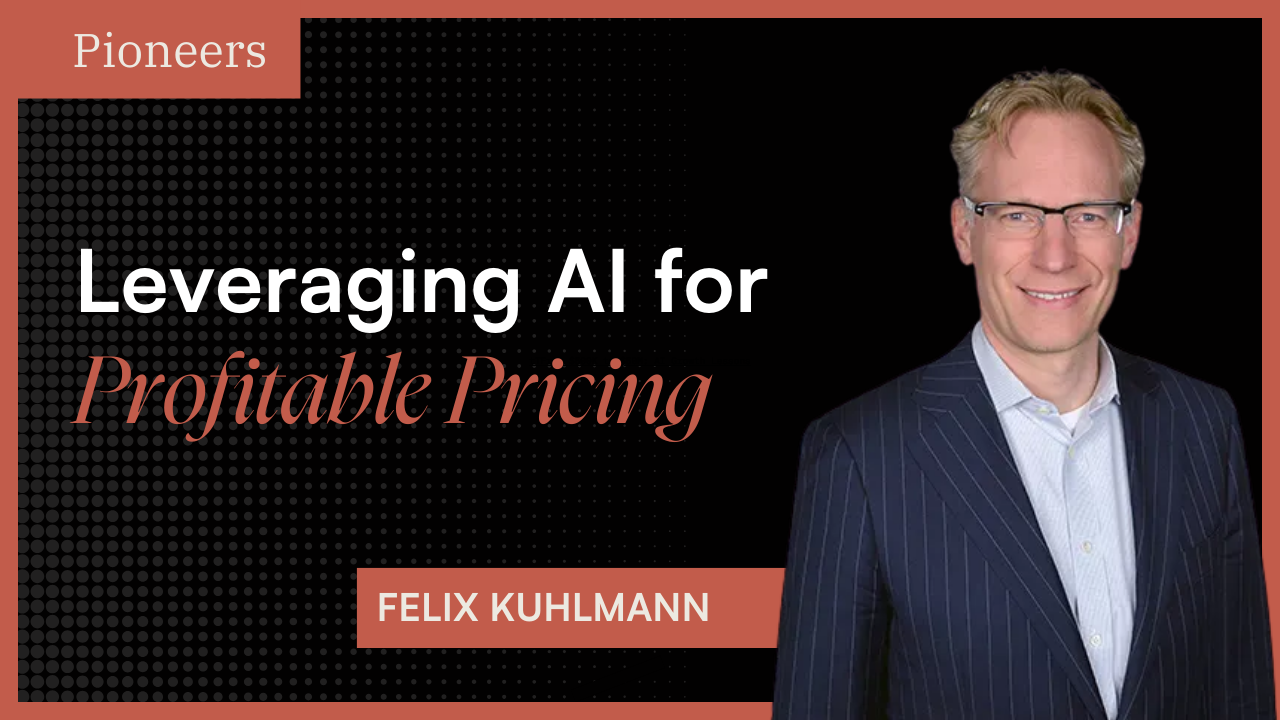This is a summary of an episode of Pioneers, an educational podcast on AI led by our founder. Join 2,000+ business leaders and AI enthusiasts and be the first to know when new episodes go live. Subscribe to our newsletter here.
TLDR;
- AI's Impact on Efficiency and Innovation: AI is significantly reshaping finance, healthcare, and legal sectors. Balancing innovation, compliance and regulations are key to streamlining operations and fostering healthy growth.
- Customization for Industry Needs: We’re seeing the development of bespoke AI solutions tailored to the specific requirements and challenges of regulated industries. This will enhance decision-making, operational efficiency, and customer service in these sectors.
- Navigating Challenges and Ethics: The adoption of AI involves navigating regulatory compliance, ethical considerations, and cultural shifts.
In the latest episode of Pioneers, I had the privilege of chatting with Lex Sokolin, a visionary investor, entrepreneur and artist who has built an impressive career at the vanguard of DeFi, Web3 and AI. He is also one of the space’s most prominent and respected voices on LinkedIn and Twitter.
The intersection of AI with complex, regulated industries represents one of the most pivotal junctures in modern business and technology. Lex has been at the forefront of this shift.
In this episode, (linked below) we delve into the nuances of how AI is not just reshaping the finance industry, but also redefining the boundaries of innovation and efficiency within these highly regulated fields.
It was clear from our conversation that it's crucial to understand the specific challenges and opportunities AI presents in these environments. The regulated nature of the space requires AI solutions that are not only innovative but also compliant with existing laws and ethical standards.
This balance between innovation and compliance is a delicate one, requiring a deep understanding of both the technological capabilities of AI and the intricate, longstanding regulatory frameworks governing these industries.
As AI promises to revolutionize every facet of the economy and our lives, navigating the myriad traditional safeguards while we innovate at breakneck speed will be one of the central challenges.
Here are the big takeaways from our fascinating conversation. But first, check out the full episode here:
The Landscape of Regulated Industries
Industries like finance, healthcare, and legal are often entangled in a web of regulations designed to protect stakeholder interests, ensure fairness, and maintain privacy. This regulatory environment has historically acted as a barrier to rapid technological adoption, with organizations in these sectors being inherently risk-averse.
However, AI is emerging as a game-changer, offering solutions that enhance efficiency while adhering to regulatory norms. The agility of AI in navigating these complex environments is tremendous, and it has the potential to radically alter how these industries operate while enhancing consumer trust.
It should be noted that regulatory landscapes are not static; they evolve with technological advancements and societal changes. This dynamic nature poses both a challenge and an opportunity for AI implementation.
On the one hand, AI developers and industry players must constantly adapt the solutions to comply with new regulations. On the other hand, this evolving landscape opens up opportunities for AI to play a role in shaping future regulations. By actively participating in regulatory discussions, AI developers can ensure that new policies are conducive to technological innovation while maintaining the necessary safeguards.
Enhanced Decision-Making with AI
A significant value proposition of AI in these industries is its unparalleled ability to process and analyze extensive data sets and provide insights that are beyond the reach of traditional analysis. In the financial sector, AI's predictive analytics can help identify market trends and risks, enabling more informed investment decisions.
It also offers scalability, which enables organizations to address complex problems and make decisions at a pace and volume that humans alone could not achieve. This capacity for enhanced decision-making extends to areas such as risk management and fraud detection. By analyzing patterns and anomalies in large datasets, AI can identify potential risks and fraudulent activities much quicker than traditional methods.
These capabilities not only optimize operational processes but also significantly impact customer satisfaction and safety, key metrics in this highly regulated industry.
AI as a Catalyst for New Value Propositions
Beyond improving existing processes, AI is instrumental in creating entirely new value propositions.
In our discussion, Lex pointed out how AI-driven personalization is revolutionizing customer engagement and service delivery. In banking, for example, AI can tailor financial advice to individual customer profiles, enhancing the customer experience. This shift towards personalization is not just a trend but a fundamental change in how services are delivered.
By leveraging AI, industries are moving towards a more client-centric model, where services are tailored to meet the unique needs and preferences of each individual, thereby creating more value and fostering stronger customer relationships.
These new value propositions signal a move towards more efficient, customer-focused, and innovative service delivery models that will redefine the competitive landscape in these sectors.
Challenges in the Path of AI Integration
The road to integrating AI in regulated industries, however, is fraught with challenges.
A primary concern is regulatory compliance, especially in sectors handling sensitive data like healthcare and finance. Integrating AI into these traditional industries requires a significant cultural shift within organizations, demanding a change in mindset at all levels.
This cultural shift involves overcoming skepticism and resistance to change, which is often prevalent in these traditional sectors.
The key to successful integration lies in demonstrating the tangible benefits of AI, fostering an environment of continuous learning, and ensuring that the workforce is adequately prepared to work alongside these advanced technologies.
Addressing these challenges requires a multifaceted approach. Organizations need to invest in training programs to equip their workforce with the skills needed to leverage AI effectively.
There is also a need for a robust governance framework to oversee AI implementation, ensuring that it aligns with both internal policies and external regulations. Collaborating with regulatory bodies and industry groups can also facilitate a smoother integration of AI, allowing for a shared understanding of its implications and the development of industry-wide standards.
By tackling these challenges head-on, industries can harness the full potential of AI while maintaining compliance and public trust.
Ethical Dimensions of AI Deployment
The question of ethics is at the core of AI deployment everywhere, especially in highly regulated industries.
It is critical to ensure that AI systems are not only efficient but also fair and unbiased. This is particularly vital in sectors where decisions can significantly impact human lives, such as healthcare and the legal industry. Ensuring that AI algorithms are transparent and accountable is a significant step in this direction.
Additionally, there's a need for ongoing dialogue and collaboration between technologists, ethicists, and industry regulators to establish ethical guidelines and standards. This collaborative approach will help in building trust and ensuring that AI is used in a way that respects individual rights and societal values.
The ethical deployment of AI also requires a proactive approach to identifying and mitigating potential biases in AI algorithms. This involves not only technical solutions but also a diverse and inclusive approach to AI development. By involving a wide range of perspectives in the design and testing of these systems, industries can reduce the likelihood of unintentional biases and ensure that AI solutions are equitable and beneficial for all segments of society.
There should be mechanisms for continuous monitoring and evaluation of AI systems to ensure they remain aligned with ethical standards and societal expectations over time.
Future Trends: AI's Accelerating Integration
As AI technology continues to advance and its benefits become more evident, we fully expect an increasing adoption rate.
The key to this future lies in developing AI solutions that are not only effective but also compliant with the unique requirements of each industry. Such specialization will enable AI solutions to be more effective and efficient, addressing industry-specific challenges and opportunities.
This trend towards accelerated integration is also likely to drive innovation in AI technology itself. As AI systems are increasingly deployed in complex, regulated environments, they will need to become more adaptable, explainable, and secure. This will push the boundaries of AI research and development, leading to advancements in areas such as natural language processing, machine learning interpretability, and cybersecurity.
These technological advancements will not only enhance the capabilities of AI in these industries but also contribute to broader societal advancements in the technology.
Customizing AI for Industry-Specific Needs
Creating customized AI systems for specific economic sectors requires a deep understanding of the industry, coupled with cutting-edge technological expertise. This must involve engaging with stakeholders at all levels - from frontline workers to top management and regulators. By involving a broad spectrum of stakeholders in the development and implementation of AI solutions, organizations can ensure that these technologies are well-aligned with industry-specific needs and are more readily accepted and integrated into existing processes.
Customization also extends to the development of industry-specific AI models and algorithms. These models need to account for the unique data structures, workflows, and decision-making processes characteristic of each industry.
For example, AI applications in healthcare must consider the nuances of medical data and patient privacy. In finance, they need to address complex market dynamics and regulatory compliance requirements. By developing bespoke solutions, industries can maximize the benefits of AI while minimizing risks and ensuring alignment with their specific operational and regulatory contexts.
Preparing for an AI-Driven Tomorrow
Organizations in regulated industries must prepare for an AI-dominated future. This preparation goes beyond technology acquisition; it involves building a workforce that is adept at working with AI, fostering a culture of innovation, and engaging in collaborative efforts among technologists, industry experts, and regulators to ensure responsible AI use.
Preparing for this future also means embracing a mindset of continuous learning and adaptation. As AI technologies evolve, so must the strategies and practices of these industries. This involves staying abreast of the latest developments in AI, being open to experimenting with new technologies, and continually assessing and refining AI applications to maximize their impact.
All of this also involves building robust data infrastructures. The effectiveness of AI is heavily reliant on the quality and quantity of data available. Traditional industries need to invest in data management systems that can efficiently collect, store, process, and protect data. This will not only enhance the performance of AI applications but also ensure compliance with data privacy and security regulations
As AI becomes more integral to operations, there is a need for strong collaboration between different departments within organizations and external partners to ensure seamless integration and maximization of AI’s potential benefits.
In Conclusion: Embracing the AI Revolution
The insights gleaned from my conversation with Lex Sokolin reaffirm the transformative potential of AI in highly regulated industries, specifically finance.
The path forward is replete with challenges, but the potential benefits are immense.
As these industries continue to embrace AI, they will not only transform their operational landscapes but also contribute significantly to societal advancement. In embracing this revolution, it's imperative for these industries to navigate the challenges thoughtfully, with a keen eye on both the technological possibilities and the ethical implications.
It will require having a clear view of the potential, and soliciting the advice and support of experts on both sides of the table. Only then can we safely and effectively integrate AI into legacy and heavily regulated industries, and reap the evident rewards that this technology promises.
.svg)





.svg)
.svg)

.svg)

.png)

